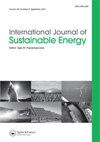评估巴基斯坦能源供应链可持续性和弹性面临的挑战:从“三重底线”和联合国可持续发展目标的角度看一个发展中经济体
IF 2.7
Q4 ENERGY & FUELS
引用次数: 1
摘要
本研究旨在从供应链可持续性和弹性的综合角度,在三重底线框架、联合国可持续发展目标7、13和能源安全的背景下,识别和分析巴基斯坦作为一个发展中经济体的能源-电力供应链所面临的挑战。随着新冠肺炎、俄乌战争和巴基斯坦洪水造成的巨大破坏等事件严重破坏了能源和电力供应链,这项研究的重要性增加了许多倍。巴基斯坦60%以上的能源电力需求来自天然气(包括液化天然气),其危害比煤炭和石油发电小。该行业正处于深度危机状态,面临着一系列复杂的挑战。探索性研究设计采用混合方法案例研究方法,用于确定和入围挑战。随后,使用BWM组对其进行排名。主要挑战包括缺乏战略、最高管理层承诺、对联合国可持续发展目标的遵守不力、结构性改革停滞、灾难、缺乏供应链导向、风险管理文化、金融不稳定、液化天然气不可用、需求不确定性、基础设施不足以及缺乏工业4.0意识。这项研究不仅为能源从业者提供了克服这些挑战的路线图,还使决策成为可能。©2023作者。由Informa UK Limited出版,交易名称为Taylor&Francis Group。本文章由计算机程序翻译,如有差异,请以英文原文为准。
Assessing challenges to sustainability and resilience of energy supply chain in Pakistan: a developing economy from Triple Bottom Line and UN SDGs’ perspective
This research aims to identify and analyse the challenges faced by the energy–power supply chain (LNG Power) in Pakistan a developing economy from combined perspectives of supply chain sustainability and resilience in the context of the Triple Bottom Line framework, UN SDGs 7, 13 and energy security. The significance of this research increases many folds as energy-power supply chains have been severely disrupted by events such as COVID-19, the Russia–Ukraine war and massive devastation caused by floods in Pakistan. Pakistan meets more than 60% of its energy-power needs from natural gas (including LNG), being less harmful than coal and oil power generation. The industry is in a state of deep crisis as it faces a complex set of challenges. Exploratory research design using a mixed method case study approach was used for the identification and shortlisting of challenges. Later these were ranked using group BWM. Major challenges were lack of strategy, top management commitment, weak compliance to UN SDGs, stalled structural reforms, disasters, lack of supply chain orientation, risk management culture, financial instability, LNG non-availability, demand uncertainty, infrastructure inadequacies and lack of awareness of Industry 4.0. The research enables policy-making besides providing energy practitioners a roadmap to overcome these challenges. © 2023 The Author(s). Published by Informa UK Limited, trading as Taylor & Francis Group.
求助全文
通过发布文献求助,成功后即可免费获取论文全文。
去求助
来源期刊

International Journal of Sustainable Energy
ENERGY & FUELS-
CiteScore
5.70
自引率
3.20%
发文量
52
期刊介绍:
Engineering and sustainable development are intrinsically linked. All capital plant and every consumable product depends on an engineering input through design, manufacture and operation, if not for the product itself then for the equipment required to process and transport the raw materials and the final product. Many aspects of sustainable development depend directly on appropriate and timely actions by engineers. Engineering is an extended process of analysis, synthesis, evaluation and execution and, therefore, it is argued that engineers must be involved from the outset of any proposal to develop sustainable solutions. Engineering embraces many disciplines and truly sustainable solutions are usually inter-disciplinary in nature.
 求助内容:
求助内容: 应助结果提醒方式:
应助结果提醒方式:


